The Injectable Thyroid Drug Market is estimated to be valued at USD 438.0 million in 2025 and is projected to reach USD 762.5 million by 2035, registering a compound annual growth rate (CAGR) of 5.6% over the forecast period.
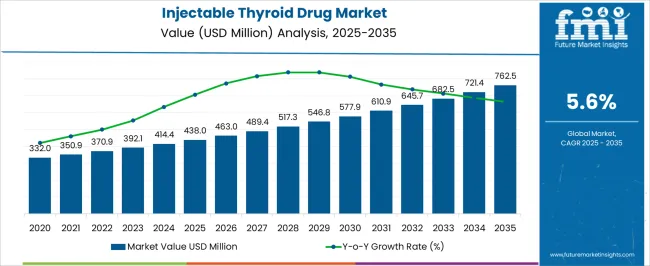
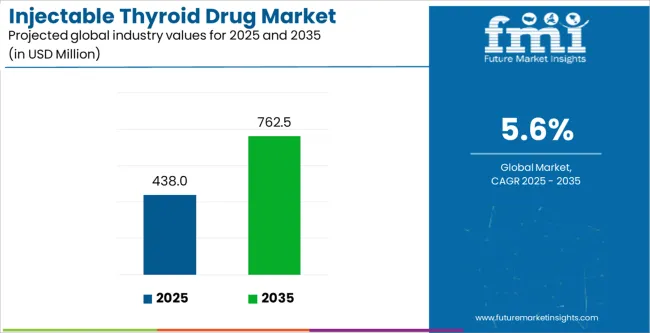
| Metric | Value |
|---|---|
| Injectable Thyroid Drug Market Estimated Value in (2025 E) | USD 438.0 million |
| Injectable Thyroid Drug Market Forecast Value in (2035 F) | USD 762.5 million |
| Forecast CAGR (2025 to 2035) | 5.6% |
The injectable thyroid drug market is progressing steadily, driven by the rising global incidence of thyroid disorders and the growing demand for rapid, effective treatment options in acute and chronic conditions. Clinical journals and hospital reports have underscored the importance of injectable formulations in critical care and perioperative settings, where immediate hormone regulation is required. Levothyroxine injections have been increasingly adopted to manage severe hypothyroidism and myxedema coma, conditions requiring swift therapeutic intervention.
Healthcare providers are prioritizing injectable therapies due to their predictable bioavailability and faster onset of action compared to oral alternatives. Investor presentations from pharmaceutical companies have highlighted increased production capacity and global supply chain strengthening to meet the rising demand.
Moreover, healthcare systems have invested in endocrinology care infrastructure and training, improving access to specialized therapies. Future growth is anticipated from innovations in drug formulations with enhanced stability, coupled with expanding hospital adoption in both developed and emerging economies.
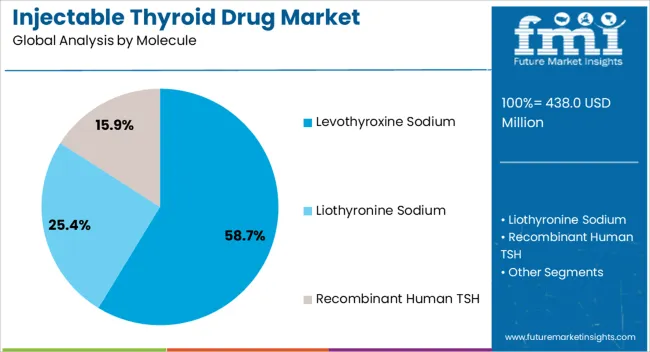
The Levothyroxine Sodium segment is projected to account for 58.7% of the injectable thyroid drug market revenue in 2025, retaining its dominance as the primary therapeutic molecule. Growth has been driven by its established role as a synthetic form of thyroxine, widely recognized for effectiveness in restoring hormonal balance in patients with hypothyroidism and related conditions.
Hospital protocols have consistently included levothyroxine injections for their reliability, dosage precision, and favorable clinical outcomes. Regulatory approvals and clinical guidelines have reinforced its use in emergency care, particularly for severe thyroid deficiencies.
Additionally, the availability of standardized dosing formulations has streamlined treatment administration, reducing clinical variability. With increasing cases of thyroid dysfunction globally, the Levothyroxine Sodium segment is expected to remain the cornerstone of injectable thyroid therapies.
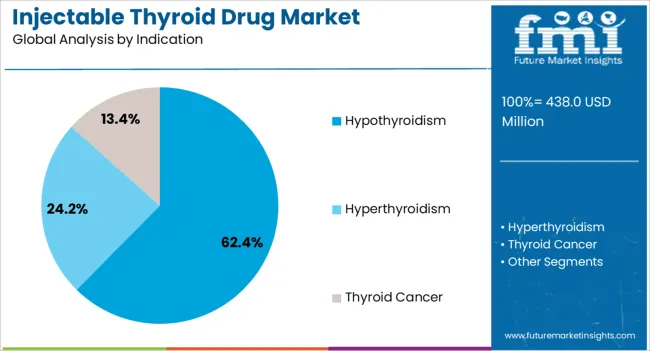
The Hypothyroidism segment is projected to contribute 62.4% of the injectable thyroid drug market revenue in 2025, reflecting its position as the most prevalent indication. Clinical data and endocrine society reports have indicated that hypothyroidism continues to affect millions worldwide, with rising diagnosis rates due to improved screening programs and awareness initiatives.
Injectable therapies have been particularly valuable in managing severe and acute hypothyroidism cases where oral administration is not viable. Hospitals have prioritized injectable drugs in intensive care units to address life-threatening complications such as myxedema coma.
Furthermore, patient demographics, including aging populations and increased autoimmune thyroid conditions, have heightened demand for effective injectable interventions. These factors have sustained hypothyroidism’s dominance as the leading treatment indication in the market.
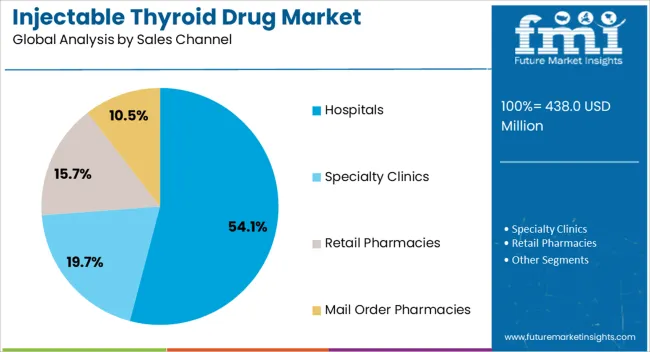
The Hospitals segment is projected to hold 54.1% of the injectable thyroid drug market revenue in 2025, maintaining its leadership as the primary sales channel. This prominence has been shaped by the clinical setting required for injectable drug administration, particularly in acute care and surgical environments.
Hospitals have served as the central distribution point due to their capacity to handle critical thyroid emergencies and ensure appropriate monitoring during treatment. Pharmaceutical manufacturers have partnered with hospital networks to ensure reliable drug availability and training of healthcare staff in proper administration protocols.
Additionally, reimbursement frameworks have favored hospital-based treatments, strengthening their position in the distribution chain. With increasing hospital admissions linked to thyroid disorders and greater investment in endocrinology departments, the Hospitals segment is expected to continue driving injectable thyroid drug adoption worldwide.
The industry recorded a historical CAGR of 5% from 2020 to 2025. Increasing incidence of chronic diseases such as diabetes, cancer, and autoimmune disorders led to a high demand for injectable medicines. These conditions often require long-term or lifelong treatment, creating a sustained market worldwide.
Developments in drug delivery systems and formulations have broadened the range of conditions treatable with injectable medicines. It is projected to lead to the development of innovative treatments for various diseases. Injectable medications offer benefits such as improved bioavailability, precise dosing, and reduced dosing frequency compared to oral medications.
By 2035, the industry is set to surge at 5.7% CAGR. Growing preference for injectable treatments and improved medication adherence are fueling growth in the injectable medicine market. This trend is particularly relevant for autoimmune diseases, particularly thyroid-related ones.
Novel injectable thyroid medications are set to improve patient outcomes by addressing specific needs, such as precise dosing and enhanced therapeutic efficacy. Rising adoption of injectable drugs has positively impacted the industry by surging innovation and addressing therapeutic needs in the management of thyroid disorders.
Growing awareness of thyroid treatment is projected to increase screenings and diagnoses of thyroid disorders. It is anticipated to create a large patient pool for pharmaceutical companies producing thyroid drugs. This growth presents an opportunity for companies to invest in research & development to develop novel, more effective thyroid drugs that cater to the evolving needs of patients.
Rising awareness of thyroid diagnosis is set to lead to collaborations between pharmaceutical companies, healthcare providers, and patient advocacy groups to develop educational materials and resources.
Growing focus on thyroid diagnosis is further set to encourage regulatory support for innovative treatments. It is set to allow pharmaceutical companies to address unmet medical needs and improve patient education & adherence.
Injectable medications have more complex manufacturing processes than oral formulations, leading to high production costs for formulation development, quality control, and packaging. The administration of injectable drugs often needs healthcare professionals. It also requires training, expertise, and time, which increases the cost of the treatment and hinders growth.
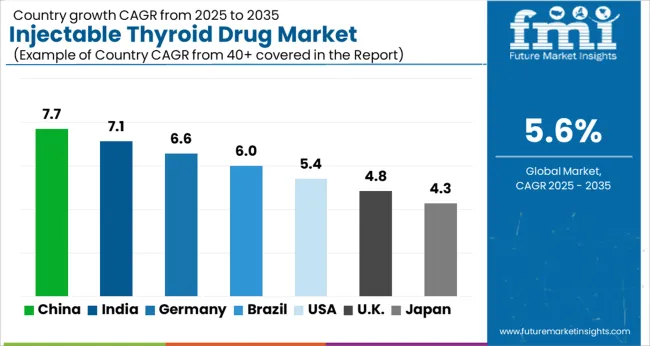
The table below showcases revenues in terms of the top five leading countries spearheaded by Canada and France. The countries are projected to lead the industry through 2035.
In North America, Canada is set to lead the industry at a CAGR of 5.6% by 2035. This growth is attributed to increasing demand for more effective and targeted thyroid treatments. In Europe, the United Kingdom is anticipated to showcase a CAGR of 3.0% by 2035.
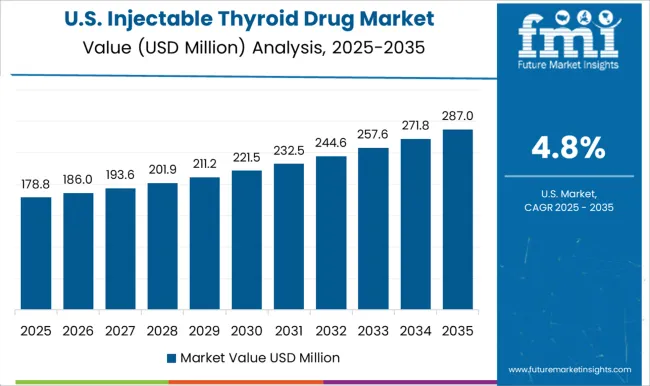
The United States is projected to exhibit a CAGR of 4.2% throughout the forecast period. The country has a substantial population. Thyroid disorders are relatively common, which is leading to a high demand for thyroid medications across the country.
The United States has a sophisticated healthcare system with unique facilities, specialized professionals, and diagnostic capabilities. These are enabling the diagnosis and treatment of thyroid disorders.
The regulatory framework in the United States, particularly overseen by the Food and Drug Administration (FDA), ensures high standards of safety, efficacy, and quality for thyroid medications. This instills confidence in both domestic and international markets, further consolidating the country’s position in the global injectable thyroid drug industry.
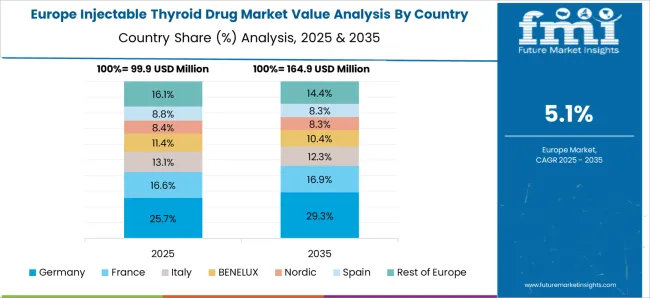
By 2035, Germany is set to lead the industry in Europe. It is projected to rise at a CAGR of 3.8% by 2035.
Germany places a strong emphasis on research and development, propelling innovation in the pharmaceutical and healthcare sectors. This commitment to advancing medical knowledge and producing high-quality thyroid drugs has led to the country’s prominent presence in the global industry.
Germany upholds stringent regulatory standards for pharmaceuticals through institutions such as the Federal Institute for Drugs and Medical Devices. These regulatory standards ensure the quality, safety, and efficacy of thyroid medications, propelling demand in the industry.
China occupied a substantial value share in the global market in 2025 and is projected to rise at a CAGR of 7.7% during the forecasted period. The country has seen a rise in the prevalence of thyroid disorders.
It is attributed to factors such as changing lifestyles, dietary patterns, and environmental influences. This surge in thyroid conditions has created a high demand for effective treatments, including injectable medications.
China's healthcare infrastructure is growing rapidly, leading to improved diagnosis, treatment, and management of various medical conditions, including thyroid disorders. Rising focus on healthcare facilities and services are the key factors propelling growth in the country.
The section below throws some light on leading revenue-generation segments and their future growth rates. Leading companies can utilize this data to invest in demanding products and services to boost their sales and stay ahead of the competition.
| Molecules | Value CAGR (2025 to 2035) |
|---|---|
| Levothyroxine Sodium | 5.1% |
| Liothyronine Sodium | 5.4% |
Levothyroxine sodium is leading the molecule segment and is majorly used in the treatment of hypothyroidism. It is the most prescribed thyroid medication due to its effectiveness in supplementing the deficient thyroid hormone levels in the body.
This medication is available in multiple dosage forms, including tablets and injectable formulations. Hence, it provides flexibility in treatment options for patients with thyroid disorders.
By 2035, the liothyronine sodium segment is set to rise at a CAGR of 5.4%. Injectable liothyronine sodium is commonly used in hospitals and emergency settings for precise dosing and monitoring under medical supervision.
It is set to be a part of a comprehensive treatment regimen for ill patients with severe hypothyroidism. Its use is also projected to rise in customized treatment regimens involving combination therapy or patient-specific adjustments.
| Sales Channel | Value CAGR (2025 to 2035) |
|---|---|
| Hospitals | 5.1% |
| Specialty Clinics | 5.2% |
| Retail Pharmacies | 5.5% |
Hospitals accounted for 33.5% industry share and are set to rise at a CAGR of 5.1% over the forecasted period. Hospitals serve as primary healthcare institutions catering to a diverse patient population, including individuals with varying degrees of thyroid disorders.
This wide patient reach creates a substantial market for injectable thyroid drugs. Hospitals are often the first point of contact for diagnosis, treatment, and management of thyroid conditions.
By 2035, the retail pharmacies segment is set to lead the sales channel category. Retail pharmacies provide injectable thyroid drugs to patients stocked with various formulations and brands.
Pharmacists educate patients on proper & accurate administration techniques, dosage instructions, side effects, and medication adherence. They offer medication management services such as synchronization, refill reminders, and therapy management to optimize treatment outcomes and improve patient adherence.
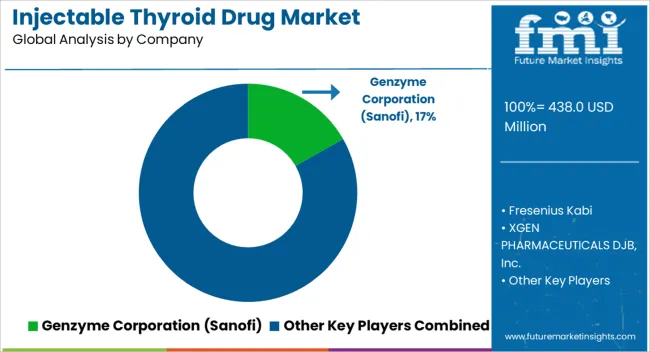
Leading producers and companies are strategically focusing on collaborations, mergers, distribution agreements, acquisitions, and partnerships to stay competitive.
This reflects an industry commitment to innovation and a way to address evolving demands. New product launches and developments are a powerful promotional strategy for companies, showcasing their commitment to innovation and scientific development.
The industry includes three key molecules, namely, levothyroxine sodium, liothyronine sodium, and recombinant human TSH.
The three key indications are hypothyroidism, hyperthyroidism, and thyroid cancer.
Leading sales channels in the industry include hospitals, specialty clinics, retail pharmacies, and mail-order pharmacies.
Key countries of North America, Latin America, East Asia, South Asia & Pacific, Western Europe, Eastern Europe, and Middle East and Africa are covered.
The global injectable thyroid drug market is estimated to be valued at USD 438.0 million in 2025.
The market size for the injectable thyroid drug market is projected to reach USD 762.5 million by 2035.
The injectable thyroid drug market is expected to grow at a 5.6% CAGR between 2025 and 2035.
The key product types in injectable thyroid drug market are levothyroxine sodium, liothyronine sodium and recombinant human tsh.
In terms of indication, hypothyroidism segment to command 62.4% share in the injectable thyroid drug market in 2025.






Full Research Suite comprises of:
Market outlook & trends analysis
Interviews & case studies
Strategic recommendations
Vendor profiles & capabilities analysis
5-year forecasts
8 regions and 60+ country-level data splits
Market segment data splits
12 months of continuous data updates
DELIVERED AS:
PDF EXCEL ONLINE
Injectable Anti-Wrinkle Treatment Market Size and Share Forecast Outlook 2025 to 2035
Injectable Nanomedicines Market Size and Share Forecast Outlook 2025 to 2035
Injectable Liquid Filling Machines Market Size and Share Forecast Outlook 2025 to 2035
Injectable Potassium Phosphate Market – Growth & Forecast 2024 to 2034
Injectable Cocoa Fillings Market
Injectable Benzodiazepine Market – Trends, Growth & Forecast 2022-2032
Injectable Bulking Agents Market
Injectable Drug Industry Analysis in North America Forecast Outlook 2025 to 2035
Injectable Drug Market Analysis - Size, Share, and Forecast Outlook 2025 to 2035
Injectable Drug Delivery Market Analysis – Growth & Trends 2024-2034
Injectable Drug Packaging Market
Global Non-injectable Insulin Market Insights – Size, Trends & Forecast 2024-2034
Lipid Injectable Market
Spinal Injectable Market Size and Share Forecast Outlook 2025 to 2035
Generic Injectable Market Report - Growth, Demand & Forecast 2025 to 2035
Global Sterile Injectable CDMO Market Analysis – Size, Share & Forecast 2024-2034
Glucagon Injectable Market
Ophthalmic Injectable Market Size and Share Forecast Outlook 2025 to 2035
Veterinary Injectable Devices Market Size and Share Forecast Outlook 2025 to 2035
Lyophilized Injectable Market Size and Share Forecast Outlook 2025 to 2035

Thank you!
You will receive an email from our Business Development Manager. Please be sure to check your SPAM/JUNK folder too.
Chat With
MaRIA